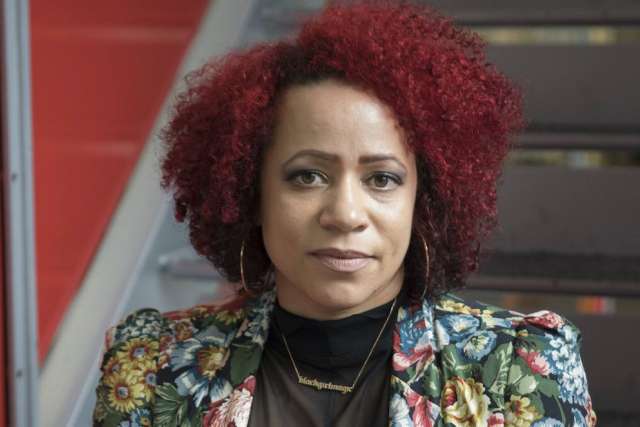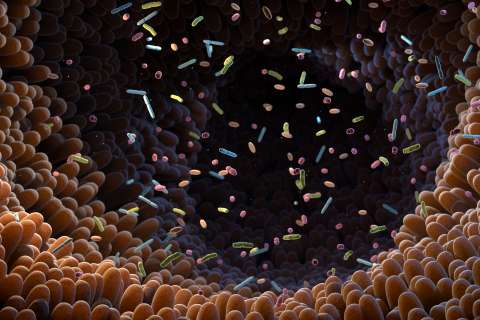“Griot” is a West African term for storyteller or, “a repository of oral tradition.” That was how Eraka Bath, MD, associate professor of psychiatry at the Jane and Terry Semel Institute for Neuroscience and Human Behavior at UCLA, introduced Nikole Hannah-Jones on Tuesday, Feb. 16 for a fireside chat on Blackness in history and medicine.
A MacArthur Fellow and Pulitzer Prize-winning reporter for The New York Times Magazine, Hannah-Jones is the creator of the landmark 1619 Project, which reframes U.S. history by marking the year the first enslaved Africans were brought to America.
In the first hour, she and Dr. Bath covered topics such as childhood and family influences on Hannah-Jones’ work, the paradox of Black patriotism, the historical erasure of Black and Indigenous people, inequities in health care and more.
Here are a few of the highlights:
The Black American experience
Hannah-Jones recalled how she was bused into school from a neighborhood that had been red-lined, a form of housing and lending discrimination. She said she observed how, as the bus rolled away from her neighborhood and into the white neighborhood, she saw more grocery stores and businesses. In high school she read Before the Mayflower, assigned by the only Black teacher she ever had, and decided to “dedicate her life to reading a history that had been kept from us.”
Frustrated by the lack of Black perspective in her school newspaper, she joined the paper and started her own column to reflect experiences she and other Black students had.
In “reclaiming history to challenge a historical amnesia and reassert Black humanity” from a legacy of erasure, Dr. Bath said, the 1619 Project was a landmark piece of journalism. Published in August of 2019 – 400 years after the beginning of Black slavery in what would become the United States – the collection of essays, poetry, fiction and an ongoing podcast explored the consequences of slavery and contributions of Black Americans in shaping the identity of this country.
The 1619 Project is “not actually about the past, it’s about America right now” – a country founded on slavery, Hannah-Jones said.
We must look at the facts of our history, she said, in order to understand current events such as the Jan. 6 domestic terrorist attack on the U.S. Capitol and last summer’s protests against police violence.
In response to a question about why the 1619 Project started with that year when atrocities to Indigenous people occurred long before that, Hannah-Jones responded: The harm caused by white colonialists to Indigenous people in America prior to 1619 is undoubtable; however, the 1619 Project specifically tackled the legacy of Black chattel slavery. The book expansion of the project, Hannah-Jones said, includes an essay from a Black Indigenous researcher on the topic of Indigenous harm and injustice.
Double-consciousness and reconciliation
Shamar Jones, adviser for medical student research and scholarship at the David Geffen School of Medicine at UCLA, cited the 1619 Project essay in which Hannah-Jones said our democracy's founding ideals – freedom, equality and justice for all – were false when they were written. “Black Americans have fought to make them true,” he said, yet each generation has continuously been overlooked.
Jones asked, “Why are we still being overlooked, especially in the workplace where we have to be near perfect, otherwise we are overly criticized and marginalized, while we see others doing far less and still succeeding?”
“Racism and anti-Blackness are as foundational as anything can be in America,” Hannah-Jones said, and therefore were always present in the systems Americans built – including modern workplaces.
For 350 years, legal, political, social and cultural resources have been put toward devaluing Black lives, she said, and while this legally ended with passage of the 1964 Civil Rights Act and its 1968 expansion, the Fair Housing Act, “almost no resources have been put into undoing it.”
Paradox of Black patriotism
Black people weren’t considered U.S. citizens until the passing of the 14th Amendment. Even then, it was legal to discriminate against them until civil rights legislation was passed, despite their service in the military and other contributions to the country.
Dr. Bath talked about being “mortified” when her mother put up an American flag outside of their family home following Barack Obama’s election. How, she asked, does one reconcile the paradoxical feelings of patriotism toward this country and anger over the treatment of Black Americans?
“We have fought the hardest for democracy and not just democracy, for ourselves,” Hannah-Jones said. “This country has never lived up to its greatest ideals, but we believe that it can, and we are going to challenge the country and fight for this country” until it lives up to the ideals of freedom and equality.
Legacy of racism in medicine
Other notable moments came from audience questions on the advancement of universal health care, social programs and the legacy of racism and slavery on medicine and science.
American medicine was built on “the experimentation of Black bodies,” Hannah-Jones said. For instance, the founding father of gynecology, James Marion Sims, gained his knowledge by experimenting on enslaved Black women without their consent. Black people were operated on without anesthesia because of the incorrect assumption that they didn’t feel pain in the same way white people did – an assumption that still influences medical practices today, studies show.
The effects of this history of pain and lack of consent are being played out with the COVID-19 vaccine distribution, Hannah-Jones noted.
We know why Black Americans have been disproportionately affected by COVID-19, she said: systemic racism, lack of access to care, unequal treatment and other social determinants of health. Yet those in charge of creating the vaccine distribution tiers have determined that being “color blind” is the best policy, instead basing the tiers on factors such as age and profession.
“It’s one of the most frustrating aspects of the society we live in,” she said.
And on the issue of vaccine hesitancy: it’s rational for Black people to be scared of the vaccines, Hannah-Jones said, given historical and systemic racism in medicine and science.
A group discussion
The second hour featured a small group panel discussion on health equity and academic medicine with Hannah-Jones; Dr. Bath; Kelsey Martin, MD, PhD, dean of the David Geffen School of Medicine; Keith Norris, MD, PhD, a professor of medicine at the medical school; Jennifer Lucero, MD, vice-chair for Diversity, Equity & Inclusion and associate dean for admissions at the medical school; and Helena Hansen, MD, PhD, professor of Psychiatry and Biobehavioral Sciences at UCLA and associate director of the Center for Social Medicine.
On the topic of the failures of the health care system toward Black people, Hannah-Jones spoke of her uncle’s experience seeking treatment for his back pain. He died at 49 after doctors failed to provide him with the testing which may have uncovered his bone cancer. Instead, they sent him to a chiropractor, whose treatment, they later found, caused the cancer to spread.
Hannah-Jones said this experience was one of many similar ones for her and other Black Americans regardless of wealth or status. “The Black experience is so universal in a way that almost no other racial group is, because of the legacy of slavery, because of the very particular legacy of anti-blackness,” she said, “that no matter what our education, social class or status, all of us have these experiences.”
Dr. Hansen, whose specialty is ethnographic research on medical and health practices, said the pandemic has exacerbated the overdose crisis for Black Americans; that means they’re dying at the highest rates from both overdose and COVID-19. This is what she called, “suffering under a master narrative” that health outcomes are driven by individual risk factors. In reality, she said, the death rates are due to the social systems that create health inequities.
Panelists discussed how the closure of more than half of the historically Black medical schools in America has impacted medicine, as well as the topic of reparations to help reduce health gaps. A financial focus alone won’t be enough to change equity and outcomes, agreed Dr. Norris and Dr. Bath: Leveraging policy and law are the path to equity.
“We have to change the way we think about health care,” Hannah-Jones said. “Housing should be a human right and education should be a human right, and certainly access to health care is the most fundamental right.
“Because none of those other things matter if you're sick and dying.”



